11 Jan 2019 | Awards, Awards Update, Fellowship, Fellowship 2018, News and features
[vc_row][vc_column][vc_column_text]
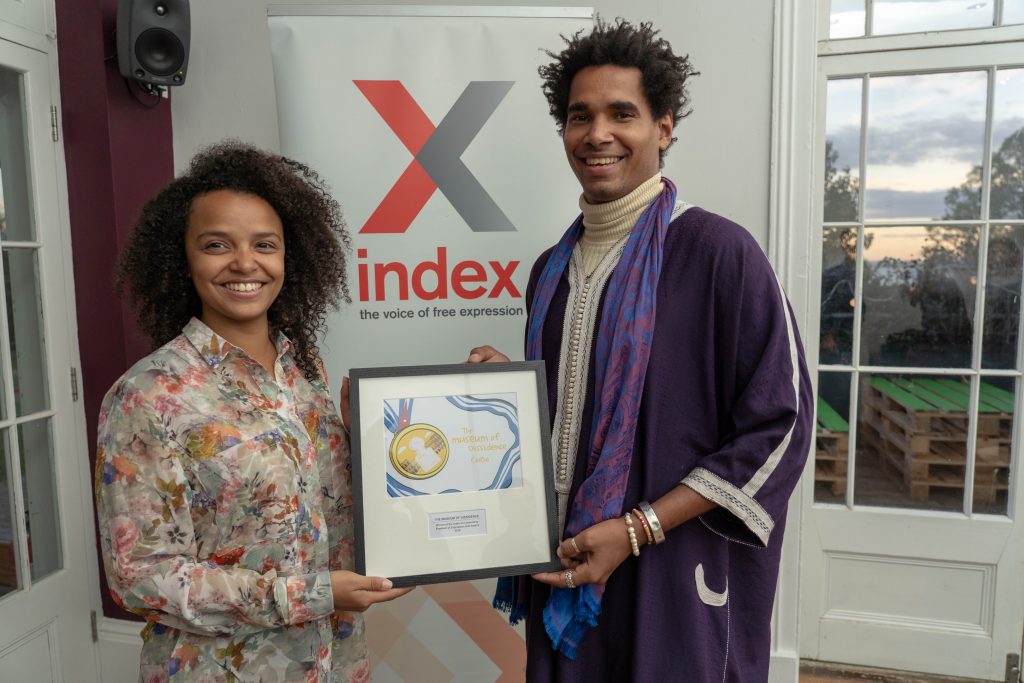
Yanelys Nuñez Leyva and Luis Manuel Otero Alcántara. The Museum of Dissidence
2018 Freedom of Expression Awards at Metal, Chalkwell Park, Essex.
Artistic freedom is under attack in Cuba, but artists are fighting back. Yanelys Nuñez Leyva and Luis Manuel Otero Alcántara, members of the 2018 Index on Censorship Freedom of Expression Award-winning Cuban artist collective the Museum of Dissidence, along with many others, are putting themselves on the line in the fight against Decree 349, a vague law intended to severely limit artistic freedom in the country. Decree 349 will see all artists — including collectives, musicians and performers — prohibited from operating in public places without prior approval from the Ministry of Culture.
“349 is the image of censorship and repression of Cuban art and culture, and is also an example of the exercise of state control over its citizens,” Otero Alcántara tells Index. “Artists, in a spectacular way, must work in a state of double resistance, as artists and as activists, because the system has control over all opportunities for artistic growth.”
For their role in peacefully protesting Decree 349, Otero Alcantara and Nuñez Leyva were among 13 artists arrested, including Cuban performance artist Tania Bruguera, in Havana on 3 December 2018. Index joined others at the Tate Modern in London on 5 December in a show of solidarity with those jailed.
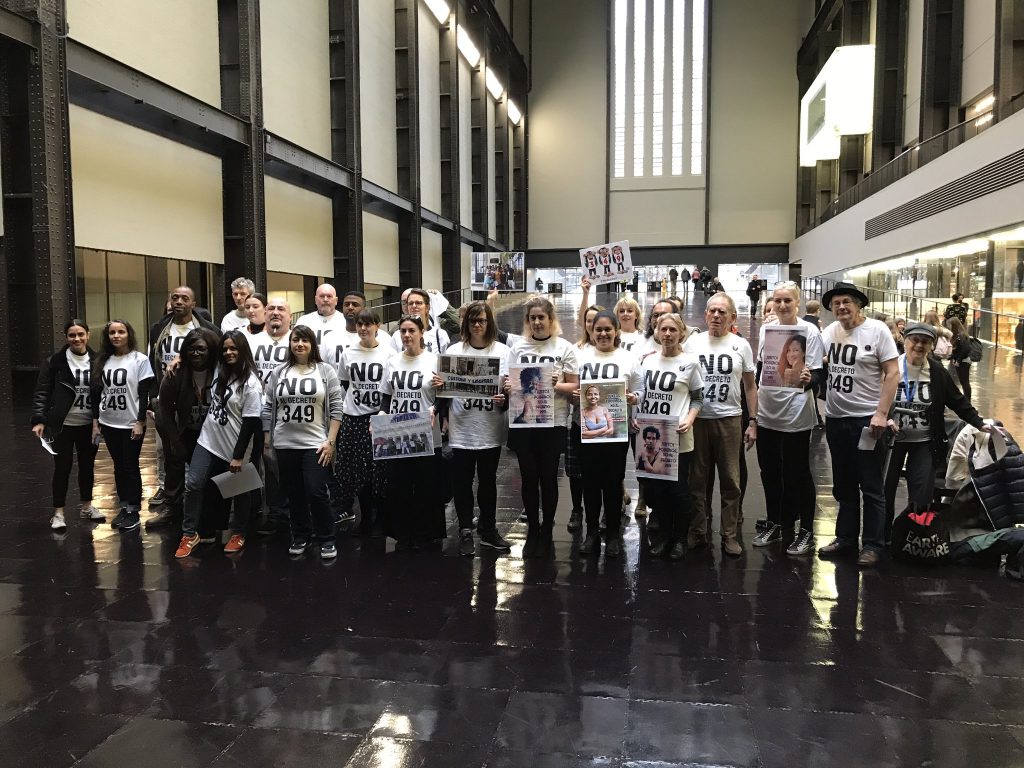
Protest in support of jailed Cuban artists at the Tate Modern gallery, London, October 2018.
On Human Rights Day on 10 December 2017, US Assistant Secretary of State Kimberly Breier tweeted: “[O]ur minds turn to the people of #Cuba, who have endured decades of repression and abuse at the regime’s hands, most recently via the creativity-crushing #Decree349.”
“The international help is positive because it makes visible the abuses of the Cuban regime against the people, but I think we must sacrifice ourselves in body and spirit — in a peaceful way — if we want to achieve our freedom,” Nuñez Leyva tells Index on Censorship. “We are very grateful for any help and pronouncements against 349. The redaction of the decree and the silence of the authorities is demonstrating that in Cuba there is a dictatorial regime in which no type of political, economic or social opening is taking place.”
In the days following all arrested artists were released, although they remained under police surveillance. Cuba’s vice minister of culture Fernando Rojas at the time told the Associated Press that changes would be made to Decree 349 but failed to open a dialogue with the artists involved in the campaign against the decree. A version of the law came into force on 7 December.
“We are determined to continue demanding the full repeal of 349,” Nuñez Leyva says. “We do not want to continue living in this perennial state of vulnerability.”
The persecution of the Museum of Dissidence isn’t limited to arrests. On 9 November Otero Alcántara took to Facebook to call out a campaign to discredit him. State security had been sending texts and holding meetings with his neighbours in what the artist said was a “desperate attempt” to “sabotage our activities”.
“The rhetoric that the government uses is well known to all — that we are mercenaries — and although most people no longer believe it, some of them decide to exclude you because you are a ‘marked’ person like you have a contagious disease,” Otero Alcántara tells Index. “You are a socially excluded and politically persecuted.”
“We try all the time not to give it too much importance, we try to smile because we really do not want to feel any bad energy,” he adds. “Our principle is love, dialogue, peaceful struggle. If they wish to defame us, it is on their conscience, not ours.”
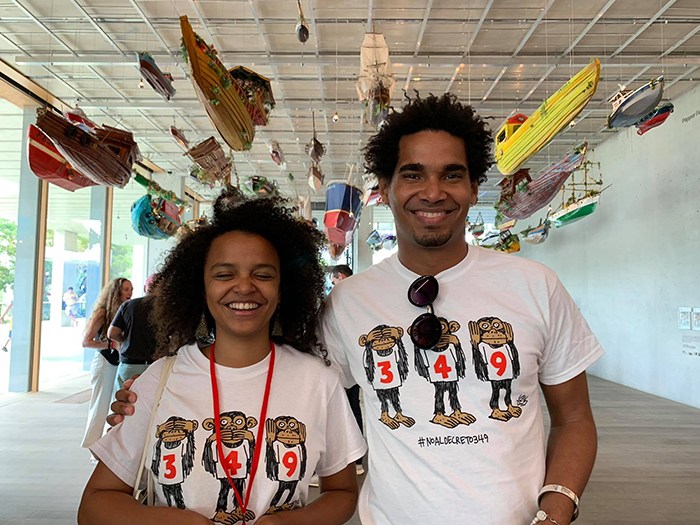
Cuban artists Luis Manuel Otero Alcantara and Yanelys Nuñez Leyva, members of the Index-award winning Museum of Dissidence
Nuñez Leyva describes the efforts to dissuade Cuban artists from protesting 349 — including the seizure of anti-349 t-shirts emblazoned with three wise monkeys when re-entering Cuba after attending the Creative Time Summit in Miami — as “a mechanism to prevent the spread of the truth and above all, to make us tired and to resort to leaving the country”. But the Museum of Dissidence will not be deterred. “To achieve that, they will have to be more vicious.”
“The government spends innumerable resources to repress any type of expression that makes it uncomfortable,” Otero Alcántara says. “It seeks to discredit activists and artists all the time by isolating them from society, from their friends, from their family.”
After a seven-month campaign to attain visas to enter the UK — which saw the Museum of Dissidence denied visas on three occasions, causing them to them miss the Index on Censorship Freedom of Expression Awards ceremony in April 2018 — Nuñez Leyva and Otero Alcántara were finally able to receive their award at Metal Culture, an arts centre in Chalkwell Hall, Southend-on-Sea, on 18 October 2018. The artists were in residence at Metal for two weeks in October as part of their partnership with Index on Censorship.
“Southend-on-Sea generously gave us all its warmth. Staff at Metal, the uncharacteristically warm climate, the brick architecture of the place, the low tide river, the local legends told by a science fiction writer, the banks that paid homage to the deceased, the interest of the local media in the Cuban cause were encouraging for us,” Nuñez Leyva says. “To realise that a calm, inclusive city is possible opens us up and make us less naive when going back to face the Cuban reality.”
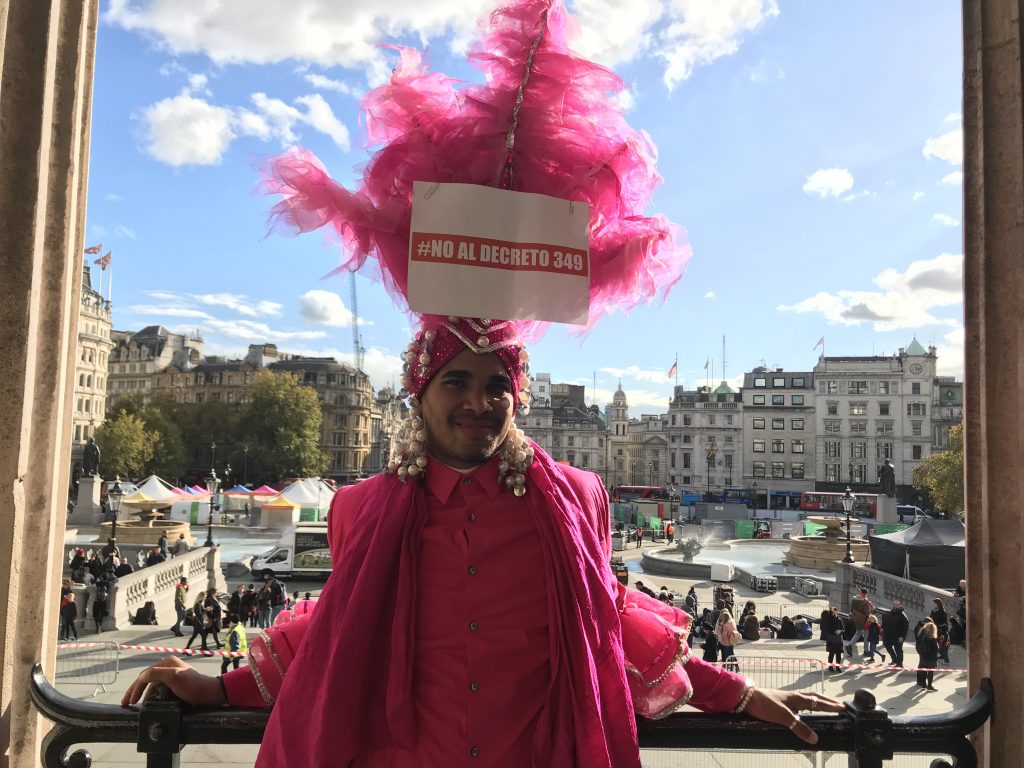
Luis Manuel Otero Alcantara as Miss Bienal
During his time in the UK, Otero Alcántara performed in Trafalgar Square on 26 October as Miss Bienal, a character he created in 2016 to symbolise the mulatto woman typified in clichés by tourist and for artistic consumption.
“Entering the National Gallery in a rumba dress without censorship made us realise the context of freedom and acceptance of difference that is breathed in London,” he says. “London is a giant city with so much art, diversity and history, it makes the body detoxify a bit from the bad energy you get living in a system like the Cuban one.”
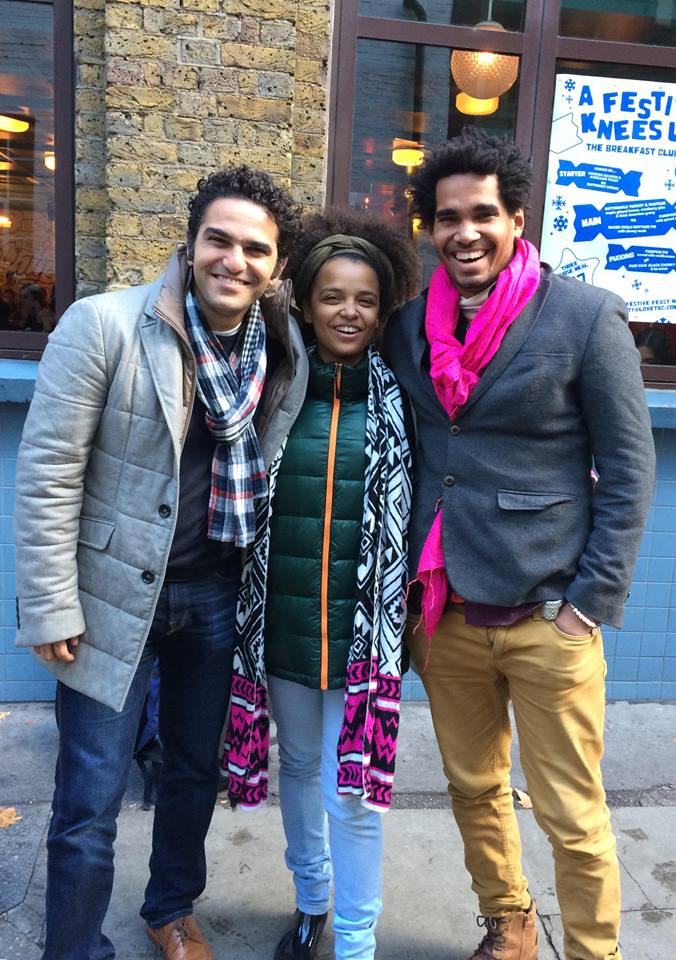
Mohamed Sameh with Yanelys Nuñez Leyva and Luis Manuel Otero Alcantara in London
While in London, the pair met with Mohamed Sameh, co-founder and international relations advisor at the Egyptian Commission for Rights and Freedoms, winner of the 2018 Index on Censorship Freedom of Expression Award for Campaigning. ECRF is one of the few remaining human rights organisations in Egypt, a country that often uses its struggle against terrorism as a justification for its crackdown on human rights.
“We shared with Mohamed the desire for prosperity in our respective countries, but also the smile that we shared, which we hold on to all the time,” Nuñez Leyva says. “The contagious smile of Mohamed is similar to that of, not only of the Museum of Dissidence in Cuba, but also Amaury Pacheco, Iris Ruiz, Coco Fusco, Student without Seed, Michel Matos, Aminta D’Cardenas, La Alianza, Yasser Castellanos, Veronica Vega, Javier Moreno, Tania Bruguera, and other artists who at this moment are fully engaged in the improvement of Cuba.”
“Although our contexts are different, we feel a total empathy with the struggles of Mohamed, because in our work we put ourselves at risk all the time for our rights and total freedom of expression, principles that for Mohamed are also non-negotiable.” [/vc_column_text][/vc_column][/vc_row][vc_row][vc_column][vc_basic_grid post_type=”post” max_items=”4″ element_width=”6″ grid_id=”vc_gid:1547483905239-0a56285c-5eb0-10″ taxonomies=”23707″][/vc_column][/vc_row]
3 Jan 2019 | Artistic Freedom, Index Arts, Magazine, News and features, Student Reading Lists, Volume 47.04 Winter 2018 Extras
[vc_row][vc_column][vc_column_text]
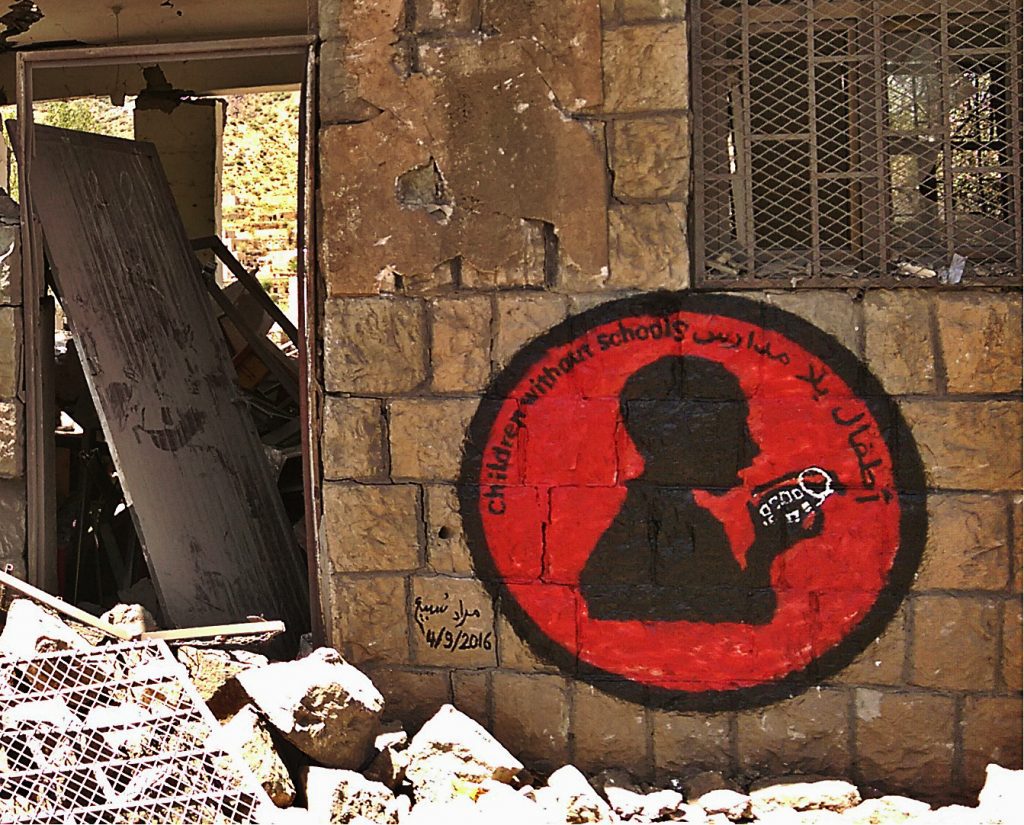
An anti-war mural created by Yemeni street artist Murad Subay, 2016 Freedom of Expression Arts Award winner.
Art has been used as a form of protest during times of crisis throughout history. It is a popular and, at times, effective platform to express opinions about societal or governmental problems, particularly when other forms of protest are not available. Protest art includes performances, site-specific installations, graffiti and street art.
Here Index highlights key articles about art and protest from around the world, from the past five decades.
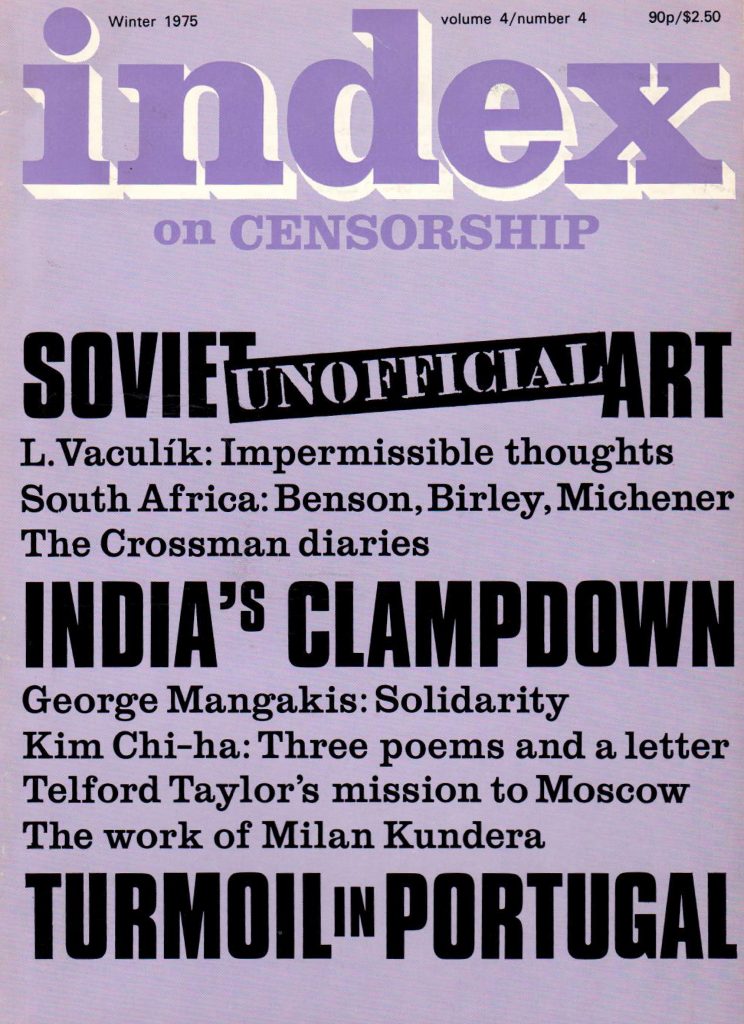
Soviet “unofficial” art
December 1975, vol. 4 issue: 4
Alexander Glezer writes about his participation in organising the unofficial art exhibit in Moscow. When the first exhibition opened, it was bulldozed by undercover police officers and agents from the KGB (Committee for State Security). In the second exhibition, the authorities were forced by the public to grant permission and ten to fifteen thousand people came to see the paintings and sculptures of 50 nonconformist artists’. Glezer, 41-years-old, was questioned by the KGB, arrested and sentenced 10 days for “hooliganism”. He was allowed to leave the Soviet Union in 1975 February.
Read the full article
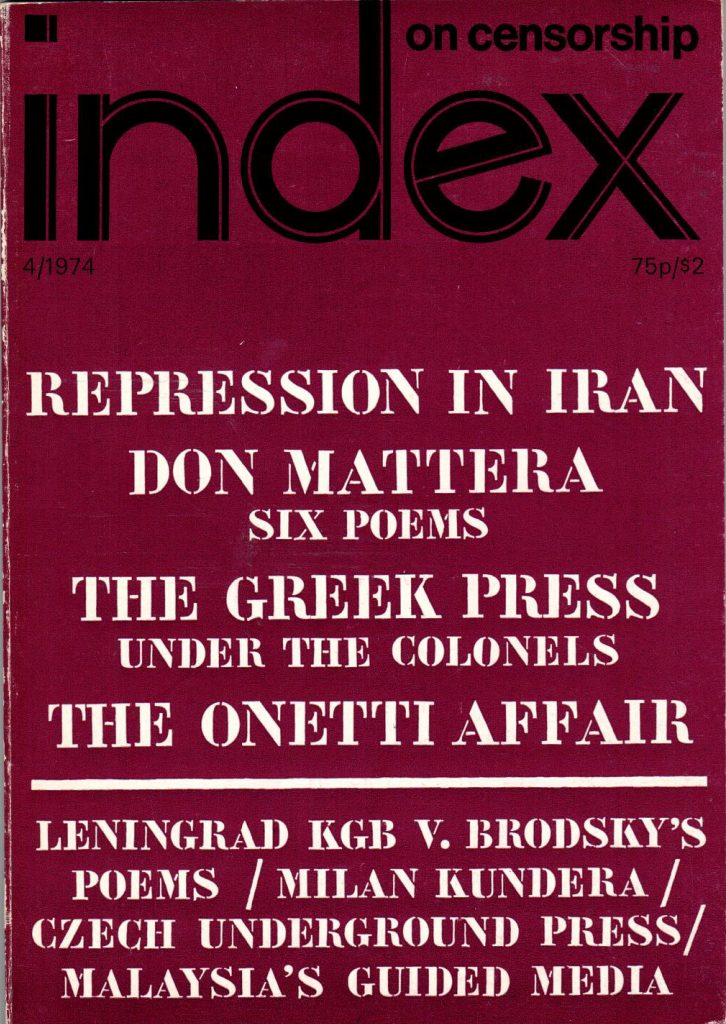
Portugal: Art triumphant
December 1974, vol. 3 issue: 4
The Sao Mamed Gallery opened with 186 artworks by 87 artists who had never shown their work in public before due to the regime’s dictating of Portuguese life. The gallery was built to celebrate the result of the military coup abolishing censorship of expression.
Published in the New York Times.
Read the full article
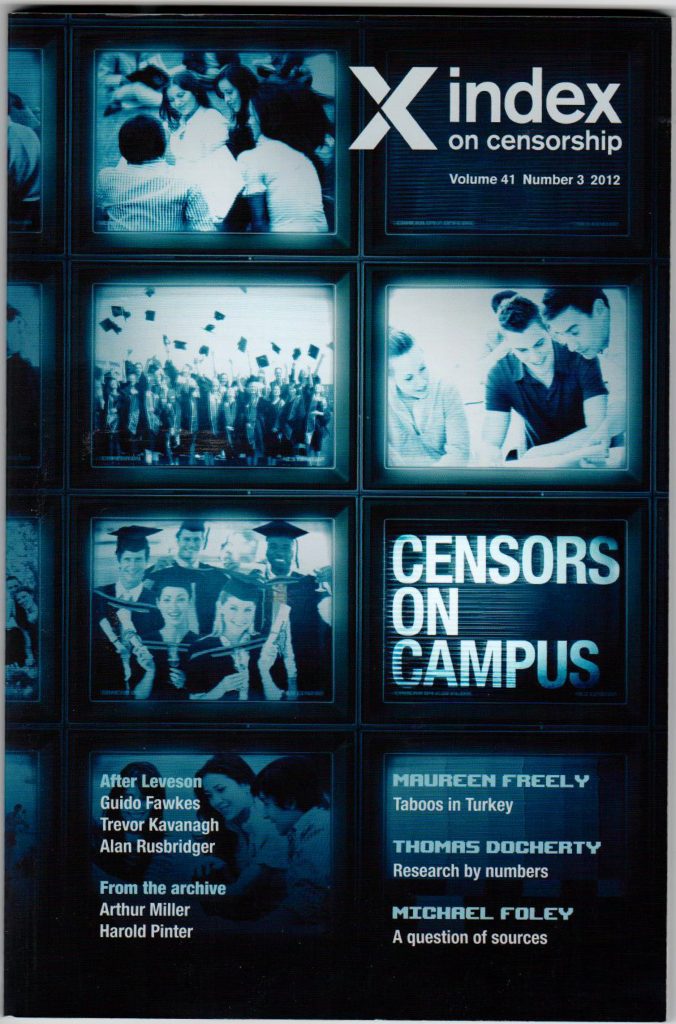
Art of Resistance
September 2012, vol. 41 issue: 3
Malu Halasa, co-curator of the exhibition Culture in Defiance: Continuing Traditions of Satire, Art and the Struggle for Freedom in Syria, writes about how the violence in Syria affected country’s art of resistance production and then created ideas of spreading this work further West which was the reason for the exhibition’s creation.
Read the full article
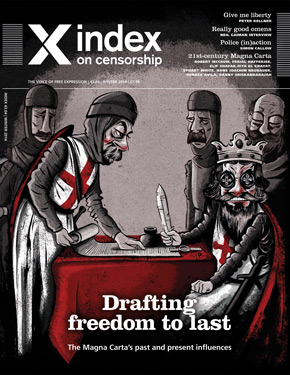
Dark Arts: Three Uzbek artists speak out on state constraints
December 2014, vol. 43 issue: 4
Author Nargis Tashpulatova interviews writer three Uzbek artists – Sid Yanishev, photographer Umida Akhmedova and conceptual artist Vyacheslav Akhunov who continue to create artwork throughout governmental threats and censorship and the regression of art in Uzbek society.
Read the full article
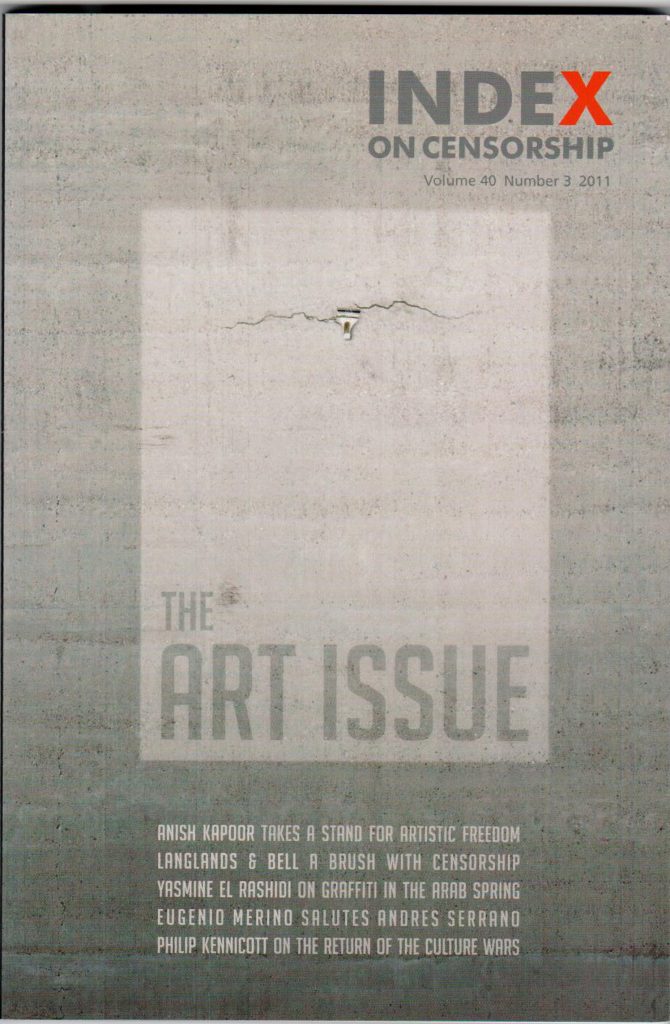
Art or Vandalism
October 2011, vol. 40 issue: 3
Yasmine El Rashidi writes on the outbreak of graffiti in the streets in Cairo during the 18 days of the Egyptian revolution.
Read the full article
[/vc_column_text][/vc_column][/vc_row][vc_row][vc_column][vc_basic_grid post_type=”post” max_items=”4″ element_width=”6″ grid_id=”vc_gid:1546513460633-7f241be5-ccf1-1″ taxonomies=”8890″][/vc_column][/vc_row]
5 Dec 2018 | Artistic Freedom, Awards, Cuba, Fellowship, Fellowship 2019, News and features
[vc_row][vc_column][vc_column_text]
Update: All arrested artists have now been released, although they remain under police surveillance. Cuba’s vice minister of culture Fernando Rojas has declared to the Associated Press that changes will be made to Decree 349 but has not opened dialogue with the artists involved in the campaign against the decree.
Index on Censorship joined others at the Tate Modern on 5 December in a show of solidarity with those artists arrested in Cuba for peacefully protesting Decree 349, a law that will severely limit artistic freedom in the country. Decree 349 will see all artists — including collectives, musicians and performers — prohibited from operating in public places without prior approval from the Ministry of Culture.
In all, 13 artists were arrested over 48 hours. Luis Manuel Otero Alcantara and Yanelys Nuñez Leyva, members of the Index on Censorship Freedom of Expression Award-winning Museum of Dissidence, were arrested in Havana on 3 December. They are being held at Vivac prison on the outskirts of Havana. The Cuban performance artist Tania Bruguera, who was in residency at the Tate Modern in October 2018, was arrested separately, released and re-arrested. Of all those arrested, only Otero Alcantara, Nuñez Leyva and Bruguera remain in custody.
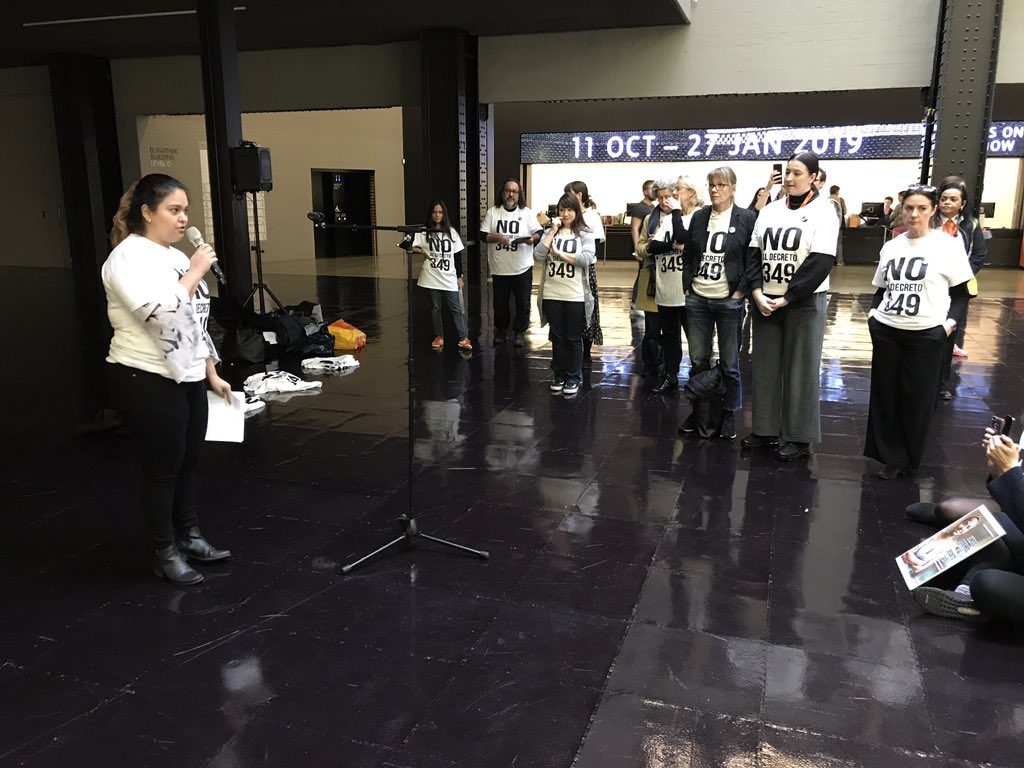
Index on Censorship’s Perla Hinojosa speaking at the Tate Modern.
Speaking at the Tate Modern, Index on Censorship’s fellowships and advocacy officer Perla Hinojosa, who has had the pleasure of working with Otero Alcantara and Nuñez Leyva, said: “We call on the Cuban government to let them know that we are watching them, we’re holding them accountable, and they must release artists who are in prison at this time and that they must drop Decree 349. Freedom of expression should not be criminalised. Art should not be criminalised. In the words of Luis Manuel, who emailed me on Sunday just before he went to prison: ‘349 is the image of censorship and repression of Cuban art and culture, and an example of the exercise of state control over its citizens’.”
Other speakers included Achim Borchardt-Hume, director of exhibitions at Tate, Jota Castro, a Dublin-based Franco-Peruvian artist, Sofia Karim, a Lonon-based architect and niece of the jailed Bangladeshi photojournalist Shahidul Alam, Alistair Hudson, director of Manchester Art Gallery and The Whitworth, and Colette Bailey, Artistic director and chief executive of Metal, the Southend-on-Sea-based arts charity.
Some read from a joint statement: “We are here in London, able to speak freely without fear. We must not take that for granted.”
It continued: “Following the recent detention of Bangladeshi photographer Shahidul Alam along with the recent murder of journalist Jamal Khashoggi, there us a global acceleration of censorship and repression of artists, journalists and academics. During these intrinsically linked turbulent times, we must join together to defend our right to debate, communicate and support one another.”
Castro read in Spanish from an open declaration for all artists campaigning against the Decree 349. It stated: “Art as a utilitarian artefact not only contravenes the Universal Declaration of Human Rights (Cuba is an active member of the United Nations Organisation), but also the basic principles of the United Nations for Education, Science and Culture (UNESCO).”
It continued: “Freedom of creation, a basic human expression, is becoming a “problematic” issue for many governments in the world. A degradation of fundamental rights is evident not only in the unfair detention of internationally recognised creatives, but mainly in attacking the fundamental rights of every single creator. Their strategy, based on the construction of a legal framework, constrains basic fundamental human rights that are inalienable such as freedom of speech. This problem occurs today on a global scale and should concern us all.”

Cuban artists Luis Manuel Otero Alcantara and Yanelys Nuñez Leyva, members of the Index-award winning Museum of Dissidence
Mohamed Sameh, from the Index on Censorship Freedom of Expression Award-winning Egypt Commission on Rights and Freedoms, offered these words of solidarity: “We are shocked to know of Yanelys and Luis Manuels’s detention. Is this the best Cuba can do to these wonderful artists? What happened to Cuba that once stood together with Nelson Mandela? We call on and ask the Cuban authorities to release Yanelys and Luis Manuel immediately. The Cuban authorities shall be held responsible of any harm that may happen to them during this shameful detention.”[/vc_column_text][/vc_column][/vc_row][vc_row][vc_column][vc_basic_grid post_type=”post” max_items=”4″ element_width=”6″ grid_id=”vc_gid:1544112913087-f4e25fac-3439-10″ taxonomies=”23772″][/vc_column][/vc_row]
5 Dec 2018 | Awards, Fellowship 2019, News and features, Press Releases
[vc_row][vc_column][vc_single_image image=”104120″ img_size=”full”][vc_column_text]Index on Censorship is proud to announce that award-winning investigative journalist Maria Ressa and actor Khalid Abdalla will join a panel of judges to decide the 2019 Freedom of Expression Awards Fellows.
The Freedom of Expression Awards, now in their 19th year, honour champions of free expression and those battling censorship around the world in the field of arts, campaigning, digital activism and journalism. Many have faced prosecution and punishment for their work.
Ressa has been a journalist in Asia for more than 30 years. She was CNN’s bureau chief in Manila then Jakarta, and became CNN’s lead investigative reporter focusing on terrorism in Southeast Asia. Now CEO and executive editor of Rappler.com, Ressa – winner of this year’s Gwen Ifill Press Freedom Award presented by the Committee to Protect Journalists – is frequently targeted by Philippines’ increasingly autocratic president Rodrigo Duterte. Ressa and her company were formally indicted on multiple counts of tax evasion in late November. She is currently on bail pending her next appearance in court on 7 December.
Abdalla is a British-Egyptian actor, producer and filmmaker. He has starred in award-winning films, including United 93, The Kite Runner and In the Last Days of the City, which he also produced. Abdalla is a founding member of three collaborative initiatives in Cairo – Cimatheque, Zero Production and Mosireen.
Abdalla said: “The abyss we are facing all over the world requires acts of courage and intellect capable of changing the terms of how we think and respond to the challenges ahead. We have to celebrate those who inspire us and lead by example, not just because they have managed to break barriers in their own contexts, but because some part of what they do holds a key for us all.”
The judging panel will also include British-Somali feminist, writer and social activist Nimco Ali, who is co-founder and director of Daughters of Eve, a survivor-led organisation which has helped to transform the approach to ending female genital mutilation (FGM). Nimco’s book RUDE: There Is No Such Thing as Over-Sharing is due out in early 2019; and British computer scientist Dr. Kate Devlin, who is a writer and senior lecturer in Social and Cultural Artificial Intelligence at King’s College London. Her book, “Turned On: Science, Sex and Robots”, explores intimacy and ethics in the digital age.
Announcing the judging panel, Index on Censorship chief executive Jodie Ginsberg said: “Our award winners and nominees often face huge personal and professional risks work defending the right for everyone to speak freely. The awards draw attention to the repression that they face every day and give us a chance to celebrate and support these inspiring journalists, activists, and artists.
“We’re excited to announce this year’s remarkable panel of judges, who are leaders and experts in their fields. The Freedom of Expression Awards Fellowship recognise global free speech heroes and provide assistance so that their important work can continue.”
Previous winners of the Freedom of Expression Awards include Nobel Peace Prize winner Pakistani education campaigner Malala Yousafzai, Honduran investigative journalist Wendy Funes and Yemeni artist Murad Subay. Hundreds of public nominations are made for the awards each year. Many of those nominated are regularly targeted by authorities or by criminal and extremist groups for their work. Some face regular death threats, others criminal prosecution.
Previous judges include Serpentine Galleries CEO Yana Peel, digital campaigner and entrepreneur Martha Lane Fox, Nobel laureate Wole Soyinka, Harry Potter actor Noma Dumezweni, novelist Elif Shafak, award-winning journalist and former editor-in-chief of Vanity Fair and The New Yorker Tina Brown and human rights lawyer and shadow Brexit secretary Keir Starmer.
The Freedom of Expression Awards Fellowship ceremony 2019 will be held on 4 April in London.
More information about the judges follows:
For Index on Censorship
Sean Gallagher, [email protected]
About the Freedom of Expression Awards Fellowship
Winners of the 2019 Freedom of Expression Awards Fellowship receive 12 months of capacity building, coaching and strategic support. Through the fellowships, Index seeks to maximise the impact and sustainability of voices at the forefront of pushing back censorship worldwide. More information
About Index on Censorship
Index on Censorship is a London-based non-profit organisation that publishes work by censored writers and artists and campaigns against censorship worldwide. Since its founding in 1972, Index on Censorship has published some of the greatest names in literature in its award-winning quarterly magazine, including Samuel Beckett, Nadine Gordimer, Mario Vargas Llosa, Arthur Miller and Kurt Vonnegut. It also has published some of the world’s best campaigning writers from Vaclav Havel to Elif Shafak.[/vc_column_text][/vc_column][/vc_row][vc_row][vc_column][vc_row_inner][vc_column_inner width=”1/2″][staff name=”Khalid Abdalla, Actor and Filmmaker” profile_image=”104118″]Khalid Abdalla is an actor, producer and filmmaker who also works in cultural production and alternative media. He has starred in award winning films, including Paul Greengrass’s United 93 and Green Zone, Marc Forster’s The Kite Runner, Tala Hadid’s The Narrow Frame of Midnight, and Tamer El Said’s In the Last Days of the City – which Khalid also produced. In documentary film he has producing credits on Hanan Abdalla’s In the Shadow of a Man and the upcoming film by Hanan Abdalla & Cressida Trew, The Vote and has appeared in Jehane Noujaim’s Oscar nominated The Square. Khalid is a founding member of three collaborative initiatives in Cairo – Cimatheque, Zero Production and Mosireen. Brought up in the UK to Egyptian parents, Cairo and London are his two cities. [/staff][/vc_column_inner][vc_column_inner width=”1/2″][staff name=”Nimco Ali, Writer and Social Activist” profile_image=”104121″]Nimco Ali is a British Somali feminist, writer and social activist. She is co-founder and director of Daughters of Eve, a survivor-led organisation which has helped to transform the approach to ending female genital mutilation (FGM), and is the lead advisor to the UK’s APPG to End FGM. She is working to ban FGM in Somaliland, is a former ambassador for #MAKERSUK and was awarded Red Magazine’s Woman of the Year award 2014 and placed No. 6 in Woman’s Hour Power List. Her book ‘RUDE’ There Is No Such Thing as Over-Sharing comes out in early 2019.[/staff][/vc_column_inner][/vc_row_inner][/vc_column][/vc_row][vc_row][vc_column width=”1/2″][staff name=”Kate Devlin, Writer and Academic” profile_image=”104081″]Kate Devlin is a writer and an academic in the department of Digital Humanities in King’s College London where she works on artificial intelligence and human-computer interaction. Her book, Turned On: Science, Sex and Robots, explores intimacy and ethics in the digital age. [/staff][/vc_column][vc_column width=”1/2″][staff name=”Maria Ressa, CEO and Executive Editor” profile_image=”104085″]Maria Ressa is CEO and executive editor of social news network Rappler in the Philippines. She has been a journalist in Asia for more than 30 years and was CNN’s bureau chief in Manila then Jakarta, and became CNN’s lead investigative reporter focusing on terrorism in Southeast Asia. She is an author of two books on terrorism, co-founder of production company Probe and later managed ABS-CBN News and Current affairs. Maria has won numerous awards for her work, including the prestigious Golden Pen of Freedom Awards in 2018.[/staff][/vc_column][/vc_row][vc_row][vc_column][vc_separator][/vc_column][/vc_row][vc_row full_width=”stretch_row_content” equal_height=”yes” css=”.vc_custom_1515150485442{background-color: #cb3000 !important;}” el_class=”text_white”][vc_column width=”1/2″][vc_custom_heading text=”Support the Index Fellowship” font_container=”tag:h2|text_align:center” use_theme_fonts=”yes” link=”url:https%3A%2F%2Fwww.indexoncensorship.org%2Fsupport-the-freedom-of-expression-awards%2F|||”][vc_column_text]
By donating to the Freedom of Expression Awards you help us support individuals and groups at the forefront of tackling censorship.
[/vc_column_text][/vc_column][vc_column width=”1/2″ css=”.vc_custom_1543427572500{background-image: url(https://www.indexoncensorship.org/wp-content/uploads/2018/05/2018-fellows-1000.jpg?id=100251) !important;background-position: center !important;background-repeat: no-repeat !important;background-size: cover !important;}”][/vc_column][/vc_row][vc_row][vc_column][vc_separator][/vc_column][/vc_row][vc_row][vc_column][vc_custom_heading text=”Don’t lose your voice. Stay informed.” font_container=”tag:h3|text_align:left” use_theme_fonts=”yes”][vc_row_inner][vc_column_inner width=”1/2″][vc_column_text]Index on Censorship is a nonprofit that campaigns for and defends free expression worldwide. We publish work by censored writers and artists, promote debate, and monitor threats to free speech. We believe that everyone should be free to express themselves without fear of harm or persecution – no matter what their views.
Join our mailing list (or follow us on Twitter or Facebook) to receive our weekly newsletter, monthly events email and periodic updates about our projects and campaigns. See a sample of what you can expect here.
Index on Censorship will not share, sell or transfer your personal information with third parties. You may unsubscribe at any time. To learn more about how we process your personal information, read our privacy policy.
You will receive an email asking you to confirm your subscription to the weekly newsletter, monthly events roundup and periodic updates about our projects and campaigns.[/vc_column_text][/vc_column_inner][vc_column_inner width=”1/2″][gravityform id=”20″ title=”false” description=”false” ajax=”false”][/vc_column_inner][/vc_row_inner][/vc_column][/vc_row]












